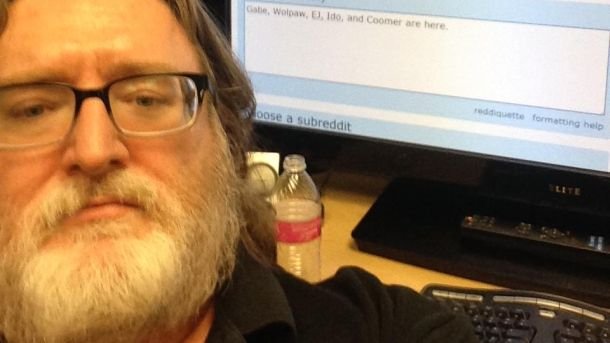Gabe Newell's AMA: Steam to become a "self-publishing system," CS:GO coming to Linux

Additional reporting by Tyler Wilde.
Valve's Gabe Newell did an AMA (Ask Me Anything) on Reddit today, answering scores of community questions and no, not revealing that he has a build of Half-Life 3 hidden in a volcano lair. If you're hearing otherwise, one user edited his (now deleted) question to include Half-Life 3 and create the appearance that Newell confirmed it. Nope. He did, however, talk about Source 2, Steam, CS: GO, and Dota 2, as well as answer a question vaguely related to HL3 in the form of a question about Ricochet 2.
The biggest news is that Valve is working on making Steam "a self-publishing system," something Newell hinted at during Steam Dev Days when he announced that Steam Greenlight is going away. Before Greenlight, Valve "got bottle-necked pretty fast on tools and decision making," says Newell. That led to Greenlight, and is now leading the company toward self-publishing.
When asked about Linux, Newell agreed that it's “probably” the future of gaming and desktops. He reiterated that Valve will not release any Steam OS exclusives, but he does think that all Steam games will eventually run on Linux/Steam OS, and says there has been surprisingly little problem getting developers to add Linux compatibility.
He also notes that Valve is “making progress” on lower cost Steam Boxes for streaming, and that Counter Strike: Global Offensive for Linux is being worked on, but there's no ETA.
In the category of personal tastes, Newell's favorite non-Valve game is Mario 64. Dota 2 is currently his favorite game and he plays about 20 hours a week—his favorite hero is Sand King and yes, he has been yelled at by a teammate before.
Here's a selection of some of Newell's other interesting answers:
Keep up to date with the most important stories and the best deals, as picked by the PC Gamer team.
On Ricochet 2 (a supposed sequel to Ricochet that's often jokingly used to refer to Half-Life 3) not being announced: “When we announced our products years in advance in the past and then were really late delivering them, it was pretty painful for both us and the community. We'd rather not repeat that.”
On what improvements we'll see in in Source 2 engine: “The biggest improvements will be in increasing productivity of content creation. That focus is driven by the importance we see UGC [User Generated Content] having going forward. A professional developer at Valve will put up with a lot of pain that won't work if users themselves have to create content.”
His vision for Steam in the next ten years: “I'm not trying to dodge the question, but we find it more useful to think in terms of feedback loops than in terms of visions/goals. Iterating with the community means that your near-term objectives change all the time. The key benefit to Steam is to shorten the length of the loop. Longer term, we see that working at the level of individual gamers, where we think of everyone as creating and publishing experience. "How can we make gamers more productive" sounds weird, but is an accurate way to characterize where we're going. It may make more sense if you think of it as "How can we make Dendi more entertaining to more people."
On SteamOS and Valve's core audience: “We see Steam Machines (along with Steam OS and the Steam Controller) as a service update to Steam, porting the experience to a new room in the house. As we've been working on it, we've focused first on the customers who already love Steam and its games. They've told us they're tired of giving up all the stuff they love when they sit in the living room, so it seemed valuable to fix that.”
On Valve's VR being “light years ahead” of the original Oculus Rift dev kit: “I'm not sure I'd agree with that. We are collaborating with them, and want their hardware to be great.”
On the future of eSports: “We still think we have a long way to go to get to the point where all of the different people that are contributing value to competitive play get everything out of it that they should. Feels like we are making pretty good progress though.
“Giving the consumers of content a direct relationship with the creators of content is something we think about a lot. That is what drove our thinking about how the community could be more involved in the tournaments that mattered to them.”
About his collaboration with JJ Abrams: “The main thing is that when we talk with him it's like talking with someone who works at Valve. That's not usually the case with people from the film industry.”
About Valve accepting cryptocurrency (Bitcoin): “There are two related issues: one is treating a crypto-currency as another currency type that we support and the broader issue is monetary behaviors of game economies. The first issue is more about crypto-currencies stabilizing as mediums of account.”
On why the company is named Valve: “Because it was better than 'Rhino Scar.'”

